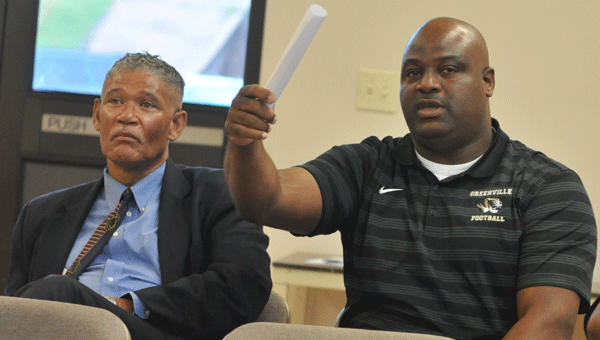BOE discuss student discipline at monthly meeting
Published 5:27 pm Friday, July 21, 2017

- Joseph West , administrative assistant for system operations, and Greenville High principal Joseph Dean discuss student referrals.
Student discipline was one of the major topics of discussion during Thursday evening’s Butler County Board of Education monthly meeting.
Superintendent John Strycker said that, though the school system’s various members seemed to have varying ideas regarding the county’s disciplinary policy, he was happy that they were largely on one accord.
“To my pleasant surprise, we had consensus on an item right away with no discussion,” Strycker said. “And that is that we want to tighten up in our school system when it comes to discipline in our hallways and in our classrooms.”
The discussion began with the now-defunct alternative school, which led to a review of the system’s policy book that Strycker called an already “tightly-disciplined policy book” regarding student behavior.
One of the biggest focal points of the discipline discussion was how to handle habitual offenders. Eventually, the conversation steered toward a contentious item on the new disciplinary policy asking a parent to spend a day with their child at school upon an eighth referral.
“How do you enforce that,” asked board of education member Brandon Sellers.
“There’s no way that you could compel a parent or guardian to come and spend a day at school. You could ask, but that’s all you can do.”
The principals in attendance—Greenville High School principal Joseph Dean, Greenville Middle School principal Bryant Marlow, McKenzie principal Miles Brown and others—all agreed that the language of the written policy to reflect the board’s inability to legally enforce such a request, but each agreed that the item was an attempt at progressive discipline that would actively involve parents in the discipline of their children.
“Mr. Marlow told me something back in November at a board meeting–we never got the parents’ attention until you’re at the point that you’re about to kick them out of school,” Sellers added.
“That’s when they’re going to come—when they think the child is going to be home with them,” said board of education member Linda Hamilton. “Then they show up. That’s the way it is.”
Hamilton also expressed disapproval of requiring students to amass 15 referrals before more serious action would be taken.
“I’m shocked that you all want to go 15,” she said. “I think that’s crazy. I mean that’s a whole semester.
“As a teacher, I’m concerned for teachers. Teachers need to be able to teach. If I have a habitual offender in my classroom and I have to wait a whole semester to get to 15 referrals, I’m not going to be able to do my job.”
Dean, and others, said that reaching 15 referrals wasn’t an inconceivable feat, and that it was that could be accrued far quicker than one might believe.
He also added that the number of referrals allows principals to clearly show parents the path that students have taken to get to such a point.
“I’ll take ownership of that [decision],” Dean said. “Because as administrators, if we can show when we visit a parent that we’ve done this step, and we’ve done this step, then we’ll get to No. 15 and it’s not an emotional thing. I actually hope that the community says ‘that’s too many.’”
Sellers proposed a point system for Class 1, 2, 3 and 4 offenses, where higher-level offenses would earn students more referrals.
Marlow said that was something that the principals considered, though they ultimately decided to err on the side of caution, as well as tradition.
“But we went back to the policy manual that was already in place and we want to be consistent across the board,” Marlow said. “Because if you do that, everyone from W.O. Parmer down to McKenzie will need to be doing the same thing. It’s too much room for discrepancy, so we felt that we’d just leave it as is.”
Strycker wound the lively debate to a close by thanking its participants for their input, stating that it was exactly the sort of board meeting he wanted to have and what he wanted the community to see.
“The good news here is we’re all on the same page,” Strycker said. “This is how I want our school family to move forward. The good news is that we want to run our schools with discipline. The good news is that is sounds like we have a shared philosophy, and that we do want to work with law enforcement and we do want to strive to work with those parents.
“I love this discussion, and for our community members want to see us engaged. We’ll tweak it some, but we’re going to move forward with this as a process. We’re going to tighten things up, we’re going to have discipline in our hallways and we’re going to have discipline in our schools.”





